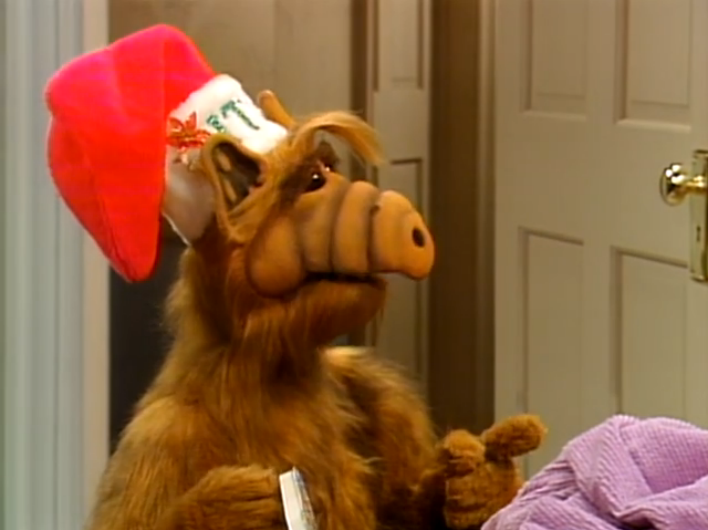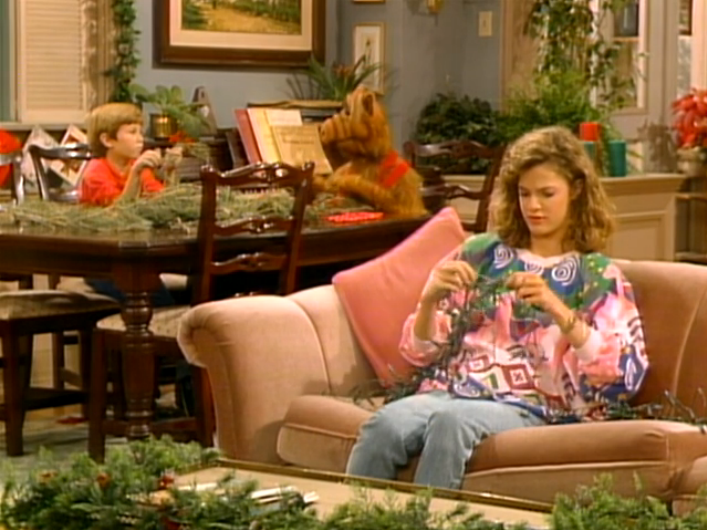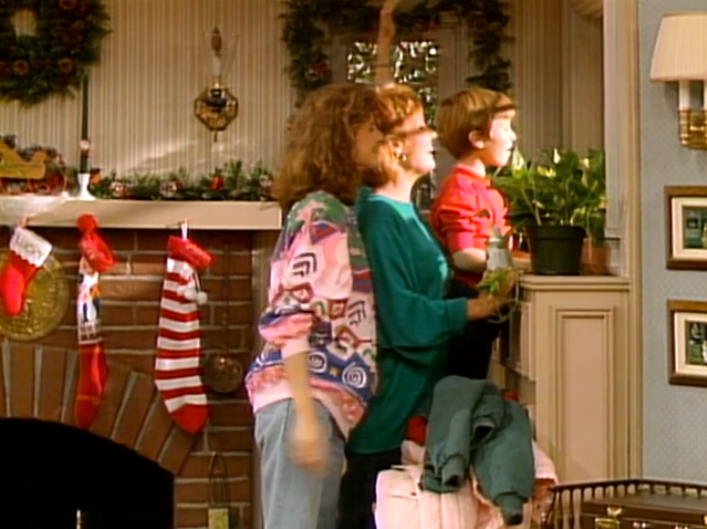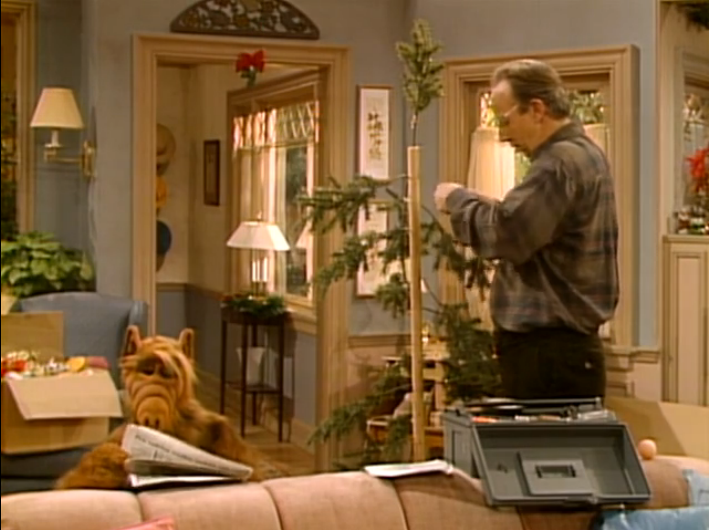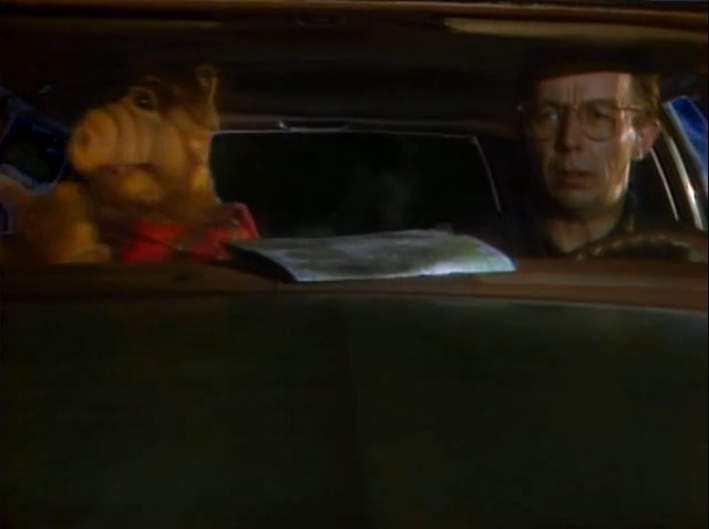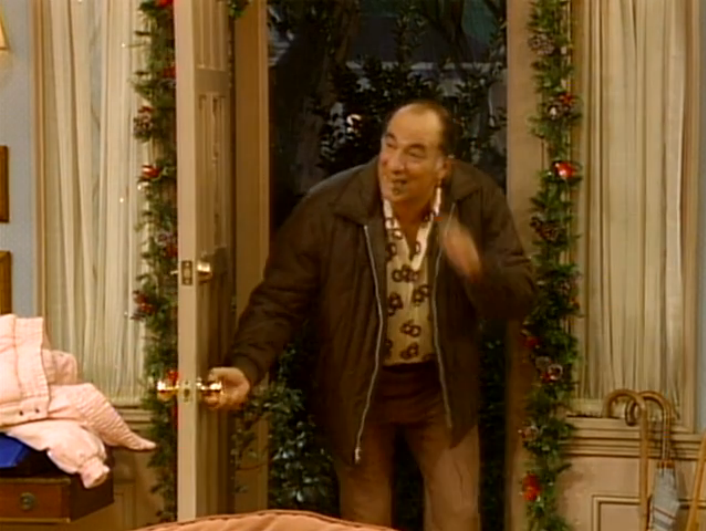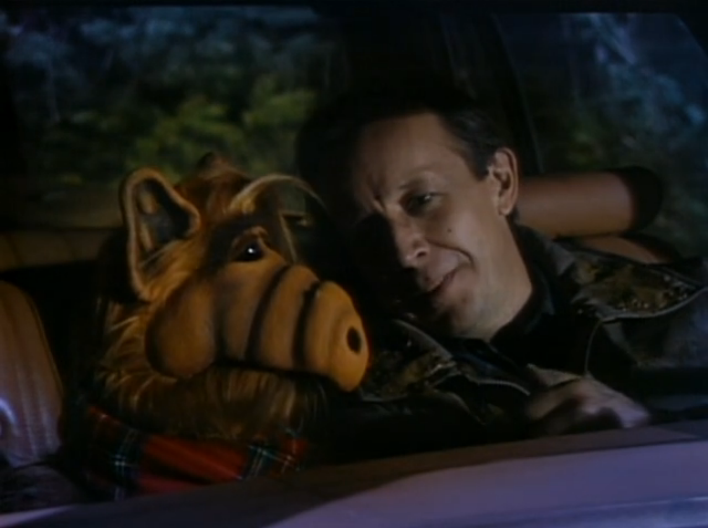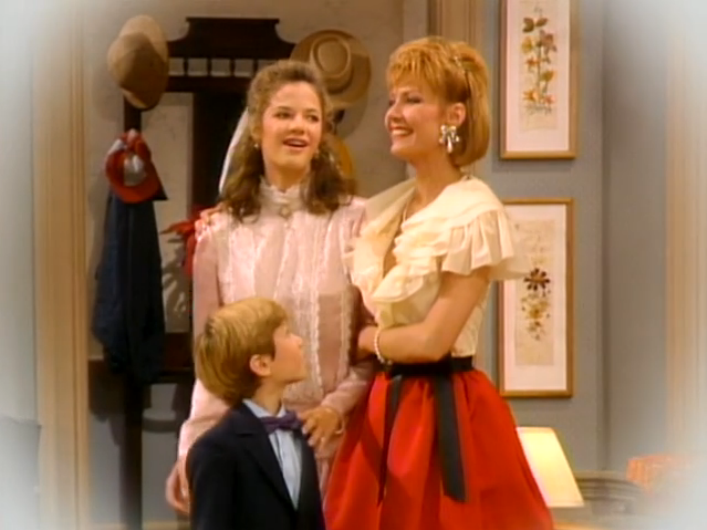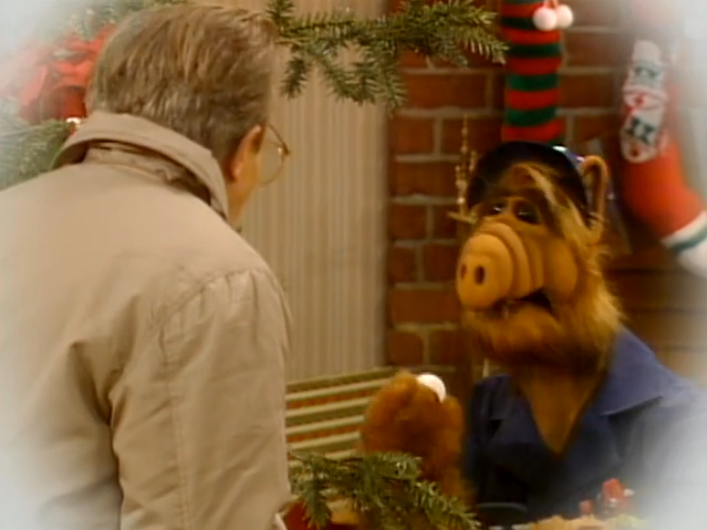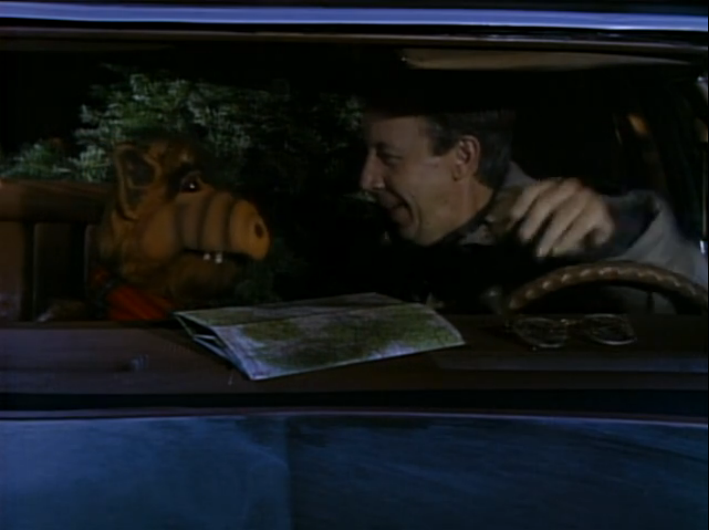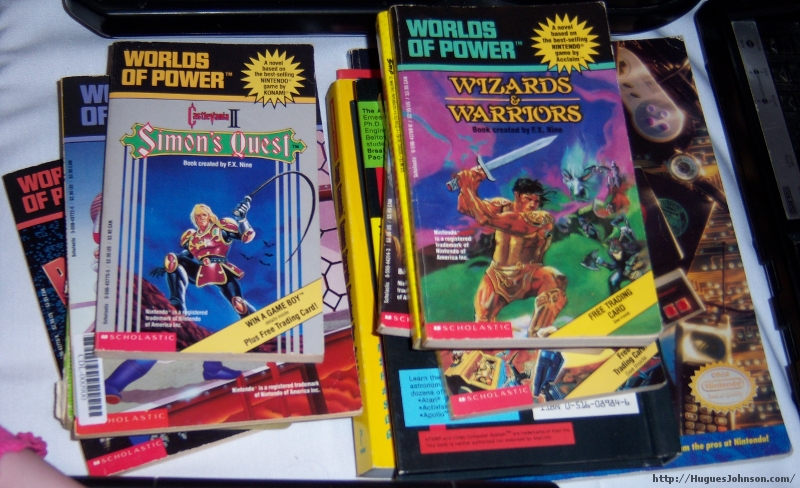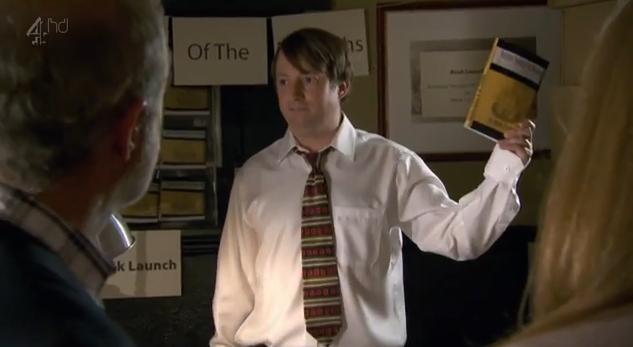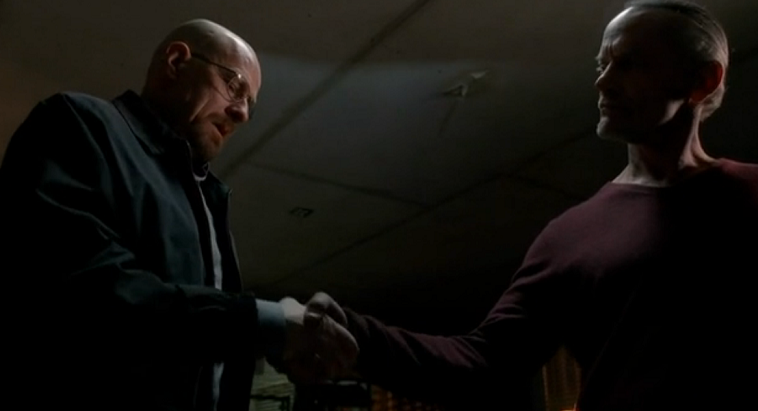Merry Christmas, everyone!!!
Okay, okay, it’s a week late. I would have loved for this to run on Christmas week, but there wasn’t much I could do apart from either a) review the show out of order or b) review two episodes in a week so that this could run sooner.
In regards to A, I didn’t feel that would really be fair. I know continuity isn’t one of ALF‘s strongest points, but if I decided to jump all around and resequence the episodes, I couldn’t be sure that I wasn’t missing information that would have helped me to understand something better. ALF is a lousy show, but I want to make sure I’m appraising its actual lousiness, and not confusing myself into finding new issues that aren’t really there.
In regards to B no fucking way am I reviewing two episodes in a week.
What I decided to do, for those that missed it, is host a live stream of this episode the week of Christmas. I’m writing this review in advance of that, because I don’t want to accidentally include anything you guys might have said, or have my opinions colored by the immense outpouring of love and affection that I expect happened when we all watched this together. So, yeah. That was the best I could really do. If you don’t like it, go start your own ALF review project. And if you do, let me know, so I can stop mine.
Anyway it’s Christmas Eve in the Tanner house! Willie and Kate are laying in bed reading old Christmas cards, which shows just how desperate they are for any excuse to avoid having sex with each other. ALF comes in wearing his stocking on his head and waving a noise-maker around, announcing that he hid all the eggs.
Yes, it’s stupid. But, you know what? I’m always going on about how ALF should be getting Earth things wrong, and that’s what’s happening here. So, God help me, I actually like this. Granted, he should be misunderstanding much more than this…but while you could conceivably base an episode around ALF misunderstanding the concept of a museum, or how the bus lines work or something, Christmas is truly a goldmine.
It’s a more or less global event, after all. No matter where you are, within any culture that chooses to celebrate it, you’ll find it tangled up with all sorts of traditions and and connotations and iconography that make perfect sense to you, because you’ve lived with it all your life. To an interplanetary interloper, however, it would be absolutely baffling. And it would lead to literally countless ways for the creature to misunderstand what’s happening around him.
Birthdays, for instance, might seem a bit silly to an alien, but you could at least explain them pretty easily. “So-and-so was born on this day, however many years ago. Every time another year passes, we celebrate and give him presents.” That might sound silly to the alien, but there wouldn’t be too much room for confusion.
Think of everything attached to Christmas, though. The birth of Christ. Who wasn’t actually born anywhere near Christmas. The co-opting of a Pagan holiday so that Christians could avoid detection. Christmas lists. Carols. TV specials. A tree that you bring inside and decorate. Stockings hanging over a fireplace. Presents sneakily dropped off in the middle of the night. Eggnog. Santa Claus. The North Pole. Flying reindeer, elfin toymakers, milk and cookies…
The list goes on. And I’m just describing the stuff that would come to mind for me. An Englishman would probably add Christmas crackers to that list. A German would shout a lot. You get the picture.
So, yeah. This is the right thing to do. Especially since the fact that during the course of the conversation ALF confuses it with Easter, New Year’s and Halloween proves that he’s trying. He’s not being a dick, for once. He’s just lost. We Earthlings have an awful lot of holidays and they each come with their attendant traditions and mores and preparations. He’s mixing them up not because he wants to ruin things, but because there’s too much for an outsider to keep straight.
This is good. This is the right way to do it. Even ALF’s inevitable fit of destruction is well-intentioned:
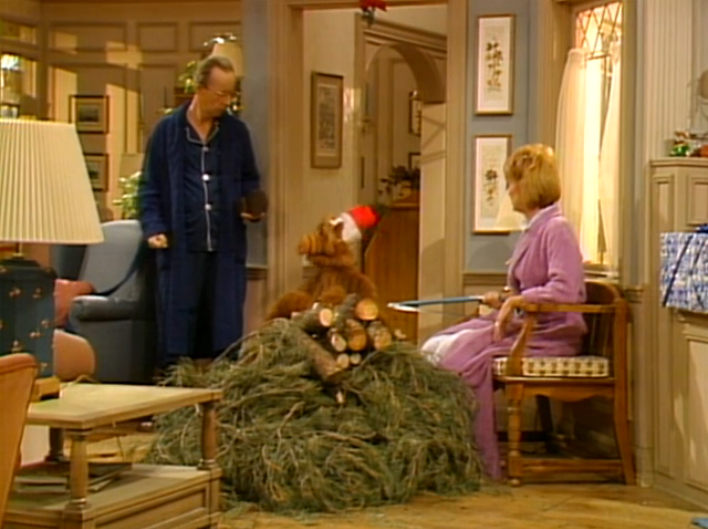
He chopped up the Christmas tree for firewood. For once, though, I’m on ALF’s side. Did Willie and Kate really wait until Christmas Eve to explain to him what the tree was for? It obviously wasn’t decorated yet, so unless somebody told him differently — and we see here that they did not — how would he know that this particular tree at this particular time of year is just supposed to sit inside covered in tinsel and baubles? He doesn’t know this shit. ALF is right and Willie and Kate are in the wrong here. If that’s not a Christmas miracle I don’t know what is.
It’s also justified by a funny exchange. (This early in the episode? Is this actually going to be a good one?)* ALF tells Willie that he has a surprise, and then Kate shouts from the next room for Willie to come quick, because ALF did something horrible to the tree. Willie asks ALF what he did, and ALF says, “I don’t want to spoil the surprise.”
See? This isn’t ground-breaking stuff, but it’s fully competent comedy. It’s really not that hard!
And look at that lighting through the window! They actually went through the trouble of making it look like that sort of dull, hazy, early-morning sunshine, and it’s even shining from a lower angle onto the set than it is normally. That’s some impressive detail for this show right there.
We’re off to a good start. Heck, by ALF standards it’s a great start. There’s enough potential absurdity in the idea of an alien celebrating his first Christmas that there really should be no problem filling out 21 minutes. Right?
…right?
…fuck you. You know that’s not right.
The credits are just the normal sequence…no superimposed snowflakes or sleigh-bells or anything. Once they end we see everyone dressed up for Christmas, I guess. I don’t know what ALF is wearing. It looks like red suspenders, but then later he gets up and I can’t tell if it’s really a ribbon draped over his shoulders for some reason, or if the suspenders they made for the puppet are just horribly tailored.
Also Lynn is wearing what I assume is a Christmas sweater, but it’s hard to tell because it always looks like she dressed herself right after hitting her head in a car accident. I’m not even sure if it’s supposed to be an ugly sweater. I mean, it is, but it’s no worse than anything else she wears any other day of the year so who knows.
Damn, I’m catty. I’m like Joan Rivers, but with all of my original skin.
Lynn is sitting on the couch, disentangling Christmas lights. That’s absolutely something that folks do around the holidays, and it’s a nice touch. I’m actually pretty impressed that they would bother to give her something appropriate to do rather than sit her motionless on the couch, waiting in awkward silence until it’s her turn to talk.
At the table, though, ALF and Brian seem to be sorting branches into piles. I assume they’re the branches from the tree ALF chopped up, but what are they doing? Organizing them by size for later storage? Why not throw them out? I honestly have no idea what they’re meant to be doing there.
Willie is out getting a new tree, and ALF says that he hopes he makes it home before it starts snowing. Kate explains that it doesn’t snow in their part of the state, but ALF explains that it has to snow, because it’s Christmas; that’s what he learned from all the Christmas stuff he’s been seeing on TV.
Again, this is good. I like that ALF has no actual experience of Christmas, and so needs to piece things together from what he’s told and what he sees. Again, this is evidence that he’s trying, which is a lot funnier than having him be a dick all the time. Good intentions with unfortunate outcomes fuel great comedy. Rampaging dickitude is just tiring.
It might seem a little silly that ALF would believe weather patterns were dictated by a holiday, but compared to everything else we are expected to believe around Christmas — whether it’s that the Son of God showed up and saved us all from Hell or that an old man in a flying sleigh is watching our every move — isn’t “snow is guaranteed to fall” a relatively small absurdity? It works. It’s not a stretch. It’s organic.
ALF outlines all of the things that he learned from Christmas specials, and he concludes by folding in some imagery from that old commercial where Santa Claus rides a Norelco razor through the snow. Guys, this is getting dangerously close to funny. Was the writing staff visited by three spirits in the night or something?
While they decorate Lynn and Kate find some of the eggs that ALF hid, making for one of those very rare moments in this show where something that happens has anything to do with something else that happened.
Willie comes home with a fake tree in a box, and the episode is still being good. I honestly don’t know what happened, but Willie gets a nice little speech here with actual character work as its punchline. He explains that he drove all over town to find another tree, but everybody was sold out. At one lot he found a tree, but it was being auctioned off to the highest bidder. Willie says he left when the bidding reached $100, because he has his pride.
That’s funny. Not almost funny, but actually funny and it got an actual laugh out of me. He then says that the tree came with a can of simulated snow, and ALF says he should have gotten a second can so that they could build a simulated snowman.
IT IS REALLY NOT THAT HARD TO WRITE COMEDY THIS IS NOT BAD
Anyway, ALF is disappointed that this is the replacement, because he wants a real tree. This might be the first sign of real weakness in the episode — why exactly does he care when he doesn’t have any experience with either type of tree yet? — but it’s certainly not the last.
The family hears some carolers outside and they go to the window to watch them. I shouldn’t have been so quick to compliment the lighting crew earlier, because now for some reason it looks like they’re staring into the fiery ball of ultimate carnage that’s six seconds away from colliding with the Earth.
Kate, Lynn and Brian decide to go with the carolers, because they can see the writing on the wall and don’t want to be around when this episode inevitably falls apart.
There is one more good joke after they leave, though, when ALF says that on Melmac you would never let children go caroling. Willie asks him why, but ALF says he can’t explain, because “you’d have to know Carol.” Yeah, that’s Fozzie Bear level stuff, but there’s a reason we like Fozzie Bear. It’s not the quality of his material…it’s the charm behind it. For the first time since the Jodie episode, ALF has some charm behind it.
I know you guys don’t like it when I enjoy things, but I’ve got give credit where it’s due. Don’t worry; I start cursing later, so you can skip down to that if you want to.
We jump ahead a little bit in time, and we can’t see the tree until Willie steps aside to reveal it. I don’t know if this bit of blocking was done on purpose, since there’s no laughter that wells up on the soundtrack, but it is pretty funny. It’s an effectively shitty prop, and a nice example of the show’s low budget actually working in its favor and strengthening the reality.
Willie hates the tree, and he and ALF decide to go chop down a real one from the same place he and Kate used to chop down trees years ago. It’s certainly a contrived premise, but it’s at least playing out in a reasonable, rational way: it’s a holiday, something went wrong, Willie wants to fix it before the family gets back.
Again, not groundbreaking, but it’s better than, say, having it be Willie’s birthday, and so he finds out his wife slept with Joe Namath, then he decides to jump out of a plane.
Seriously dudes, that one sucked.
Willie and ALF sit in a fake car and pretend to drive while some stock footage of a forest plays behind them. They explain for our benefit that they can’t find the place Willie used to go to cut down trees, which I definitely buy if it’s been a long time and it’s dark out, but it is a little bit silly that he doesn’t just pull over and chop down one of the tens of millions of trees we’re watching him drive by right now.
ALF is navigating. He tells Willie to make a turn onto a road that’s not actually there, and they end up in a ditch. You know, there was a scene in the American version of The Office where Michael drove into a lake because his GPS told him to turn there.
I never had a problem with that because I thought it was a nice — though admittedly absurd — joke about the way we rely on instructions rather than trusting our common sense, but apparently a lot of people felt that that was “too stupid” for the show and were turned off by it. Maybe I just didn’t think that way because the show was already pretty fuckin’ stupid, but what do I know.
Either way, I bring that up because while it might be pretty dumb to drive into a lake because you’re used to trusting your GPS, what happens here is infinitely more moronic. Willie doesn’t see a road, but he takes ALF’s word for it that it exists…despite the fact that he can see there is not a road there and he is driving into a ditch. What’s more, ALF is an alien. He doesn’t know this area. How could he? How could he even know how to read a map properly?
Obeying a GPS makes some kind of sense because you’re deferring to what you assume is an authority on the subject. Here Willie is actively disregarding what he actually sees happening in order to defer to somebody who unquestionably knows nothing about what’s going on.
In a word, it’s bullshit.
Anyway the family comes home from a night of caroling, and they find the tree unfinished. They read a note that Willie left, and start to worry because he left it a while ago and he’s still not home.
Then they hear somebody else singing outside, and their door opens to reveal…
Mr. Ochmonek! Holy shit! We haven’t seen this guy in…ten episodes! Jesus.
I was excited because I thought this meant we’d find out what happened to his wife, but…nope. We don’t even find out why he came over. It’s really bizarre.
He kisses Kate under the mistletoe, and there’s a funny enough moment when he passively demands some eggnog, but what, exactly, is the point of this scene?
When I first watched the episode I thought the payoff would be that he goes out to find Willie or something, but instead he just shows up for about a minute and we never see him again. What’s he doing on Christmas Eve without his wife? Why is he here? Nobody invited his ass.
It’s like ALF thought it would be nice for us to see a beloved character again, but that doesn’t work when we’ve only seen the guy once before, ten weeks ago, and didn’t even care about him then. “Hey, everybody! Remember your old pal Mr. Ochmonek?! No? Well, here he is! Merry Christmas!”
By this point the episode is almost totally off the rails. (In a very short time, it will be totally off the rails.) They sure did squander all the good-will the first act managed to build up.
ALF and Willie are still stuck in the car, which should be a promising enough situation. Especially as Willie starts to tell ALF about the Christmases he had as a kid, and the fact that they always had a real tree and so forth.
This should be nice. Maybe a bit maudlin, but so what? It’s Christmas Eve. Willie can reminisce and wish he was with his family. In fact, this moment would ideally tie right back into the first scene, with he and Kate reading the old Christmas cards. This speech should end with him realizing that somewhere along the way he lost sight of what made Christmas really great, or something, and got hung up on how things looked.
I don’t know. I’m not saying that would be good. But it would be sort of neutrally lame in a well-established way. Instead it’s Willie and ALF in a car and a story that literally gets abandoned because the writers don’t want to figure out a way to turn it into anything.
Stuff like this is why I feel as though we’re watching these characters act out the first draft of the script; they write the story up to a certain point, realize they’re no longer interested in doing what they planned to do, and then just skip over things or abandon them.
That’s okay. I’m a writer, too. Not only is it a given that you’ll end up following a different narrative path than you might have expected, but it’s a good thing as well. Your job, then, is to write this better story as it revealed itself to you, and then go back and fix things (if not completely rewrite them) so that this new story makes sense. What you don’t do is what this show does weekly: leave everything exactly as it is and hope to shit your audience isn’t paying attention.
As if on cue, hey look, a dream sequence. Lucky us.
Willie drifts off and dreams about his family in the living room. Nothing is different except for their clothes, which, to be honest, change every day anyway and so this is no evidence of Willie having any creativity whatsoever.
Everything is pretty much as it really is back home, except that Mr. Ochmonek isn’t drunkenly fumbling around with Kate’s tits. Willie comes home, in the dream, with the same fake tree he had before, only this time the family loves it.
He says something about how glad he is that an alien doesn’t live here, which implies that things are happier in this fantasy without ALF. I’m glad that Willie’s awareness of the fact that ALF bends his life over and fucks it every chance he gets is manifesting itself in some way…but I do wish it was manifesting itself as a brutal screwdriver attack on the alien instead.
Kate says that she thinks the tree is leaning too far to the left, so she calls the tree repairman. When he shows up, it turns out to be ALF.
I think it’s funny that in both of Willie’s unnecessary dream sequences so far, ALF shows up for even less necessary reasons. Did Fusco insist on being in every scene, even if his character had jack-shit to do with anything?
Willie panics because ALF is an alien or something. I don’t know. Neither do the writers; they’re just running out the clock. “Oh, Tannerbaum” started out just fine, but then nobody on the staff knew where to go from there and so we’re getting silly dream sequences with just a few minutes left in the episode because that’s easier than actually wrapping up anything that happened earlier.
Anyway ALF the tree repairman has to take the tree back to the shop to fix it, and Willie gets upset and tries to keep the tree. He and ALF tug on it for a while. I half expected the credits to come up at this point and make it abundantly clear that the people making this show literally stopped giving a shit at this precise moment.
Willie wakes up only to find that there is a real tree in the car with them, because ALF went out and chopped it down while he was sleeping. Willie feels bad, and there you go. That’s your Christmas moral: don’t ever dream mean things about an alien, because while you are dreaming them that same alien might be doing nice things for you.
Amen.
It starts to snow, a park ranger comes up and gets mad at Willie for cutting down the tree without a permit, ALF hides under a blanket, and he and Willie whisper “Merry Christmas” to each other. Sweet holy barf did that episode fall apart.
Fortunately it’s Christmas Eve, and as per tradition every adult male is allowed to commit one crime of their choice without there being any consequence, so the Tanners get to keep the tree.
Nah, I’m being wry. Willie does say that he had to pay a fine, but honestly I’m not sure why he still gets to keep the tree. If you caught me stealing the Scales of Justice from in front of the courthouse, I’d expect to be hit with a fine or something, sure. I wouldn’t expect that after I paid the fine I’d get to keep them, though.
It’s bizarre. I don’t know. Who cares. ALF gets a ViewMaster and the episode is over.
Merry Christmas you fucks.
——
* No.
